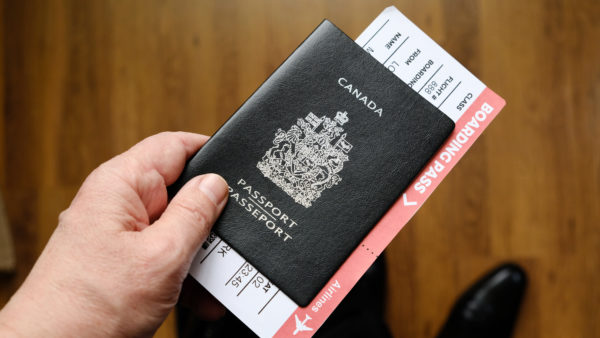It’s here: the ultimate list of tips for immigrants from WES Advisor!
We have combed our archives—including blogs, e-guides, and webinars—to locate the 100 best tips for your journey. There is something for everyone in this essential immigration tips list.
Browse by category:
- Pre-Arrival Tips (15 Tips)
- Immigrating to the U.S. (10 Tips)
- Immigrating to Canada (10 Tips)
- Job Search & Interview Tips (15 Tips)
- Career Advice (10 Tips)
- Tips for International Students (10 Tips)
- WES Help: Credential Evaluations (20 Tips)
- General Immigration Advice (10 Tips)
Everything you need to know is here—read on!
PRE-ARRIVAL TIPS

- Learn about your destination country, because immigration policies are very different for the United States and Canada.
- Start looking for a job before you move. Do you know the latest requirements for an H-1B work visa?
- Because you will be communicating remotely, learn how to conduct successful phone and video interviews.
- Or, if you are an international student in the U.S., familiarize yourself with visa policies. For example, learn how different majors can affect how long you can stay and work after graduation.
- Prepare for professional success by learning about local workplace culture. Then, determine what steps are necessary to advance in your field.
- Develop your transferable skills, so you can find a new job easily based on your existing qualifications.
- Make sure you know about the most common visa scams—and how to avoid them.
- Practice your English skills; then, decide what type of language test you might need to take to prove your reading and writing proficiency.
- Determine if you need a credential evaluation. Many employers and academic institutions prefer that international candidates demonstrate their past education and training through an equivalency report.
- Apply for a credential evaluation early, so that your report will be ready on time.
- Look for loans, scholarships, grants, and other financial aid resources to help reduce your costs.
- Protect your mental health. Newcomers often experience a period of stress, depression, loneliness, and uncertainty. However, you can learn to overcome these feelings and embrace your new environment.
- Get advice from others who made the journey before you. Read immigrant success stories for insights and moral support.
- Find out if you will have specific immigration guidelines to meet (for example, if you are arriving from China, India, or Nigeria). Your journey will be easier if you are using the latest, most accurate information.
- Make sure you know all of the latest policy updates that could affect your plans for working or studying in North America.
IF YOU ARE IMMIGRATING TO THE U.S.

- Learn which visas you will need to work or study in the United States.
- Prepare for the visa lottery. That’s because you will have a short window of time to apply each year.
- Determine which type of visa you need. For example, students need an F-1 visa, while the most common type of work visa is the H-1B.
- Consider getting an immigration attorney. They can help you navigate fast-changing immigration policies. Learn about free legal aid for immigrants in the U.S.
- If you are concerned about how you will fit in, learn what others have experienced as immigrants from various cultural and racial backgrounds.
- Learn the benefits of taking an English proficiency test, such as the IELTS, TOEFL, or Duolingo English test, and then practice to improve your score.
- Cybercrime is one of the biggest risks that you are likely to encounter in the United States. Make sure that your accounts are safe from hackers.
- Engineering is one of the most popular STEM fields studied and practiced by immigrants in the U.S. Discover how to find employment through this career field. Then, determine if it is right for you.
- Before you go on job interviews, learn how to leverage your international education and work experience in the U.S.
- Depending on your field and qualifications, it might benefit you to learn a few “survival strategies” for the competitive labor market in the United States.
IF YOU ARE IMMIGRATING TO CANADA

- Work on improving your Express Entry score before applying for permanent residency in Canada.
- Take a practice test for the International English Language Testing Exam (IELTS) to see if you need to work on your English before immigrating to Canada.
- There are also several provinces where it will benefit you to brush up on your French.
- Canada is made up of 10 provinces and three territories—each with its own immigration policies. Learn about the differences, and which factors might influence where you live and work in Canada.
- Ask Canadian friends to help improve your communication skills. Build your confidence by practicing with others and receiving feedback. This can help you communicate in a culturally appropriate way.
- Networking will also help you adjust once you move to Canada. Here is some great advice about how to meet people, make connections, and develop your social skills.
- Stay ahead of the labor market: Learn about your career prospects in Canada.
- Consider taking online courses to make you more eligible for jobs. Studying online can be a cheaper and more flexible option for people who are working while they continue to develop their skills.
- You probably want to open a bank account and start building credit right away. Here’s how.
- Learn about Provincial Nominee Program (PNP) opportunities to help you decide where to settle.
JOB SEARCH AND INTERVIEW TIPS

- Ask yourself: Am I completely prepared to launch my job search? Starting without the correct strategy could mean missing out on great opportunities.
- Prepare by learning about the hiring process directly from a human resources (HR) specialist.
- It all starts with a strong résumé. Have someone you trust read your résumé and provide feedback.
- Make sure you provide your contact information! Even if you include it in your cover letter, it needs to be on the résumé, too—in case this page is handled separately.
- Three things you should never do on your résumé: Do not include a photo of yourself. Do not mention your salary expectations. Do not let your information exceed one typed page.
- Customize your cover letter for each company and job opportunity. It is time-consuming, but it will help you stand out from other candidates.
- And do not forget about your soft skills! Traits like communication and organization are highly prized by employers. Mention these strengths in your cover letter and during your interview.
- Note your credential evaluation on your résumé, in your cover letter, and during job interviews. It helps employers understand your background, making you stand out as a stronger candidate.
- Keep a complete record of your job search! Save every job posting in a separate file on your computer, or print it out. That’s because it will be deleted after the posting is closed.
- Job interviews are all about preparation. Learn about the six interview types so that you will be ready to anticipate the situation. That way, you will give an exemplary interview.
- During an interview, you will be asked if you have any questions. It is good to have some prepared, to show your interest. Here are five questions you can ask at any job interview.
- Did you know that there are important cultural customs regarding your behavior after a job interview? Here’s how to follow up with your prospective employer.
- Make the most of LinkedIn: Write an attention-grabbing headline such as: “Motivated, experienced sales manager.” Under each job title or previous position, you should have at least three bullet points with strong examples of your expertise.
- Your employer is likely to look at your public social media pages—so you might want to consider cultivating a personal brand. Define your vision, mission, and core values.
- Your job application, social media presence, and LinkedIn profile should combine to create a narrative about your professional experience. Show employers your career trajectory—instead of just a list of jobs.
CAREER ADVICE

- Find out what you can add to today’s skills-based economy in North America. How can you continue to be a valuable asset to your company in the long-term?
- It never hurts to continue your professional development. Start by honestly assessing your current job skills. If necessary, seek additional training to make you a more valuable employee.
- Learn how to market your international education. Employers typically take less than 20 seconds to review your application for employment. As a result, you must make the decision to hire you as easy as possible.
- You should also read about what North American employers seek in a top candidate.
- When entering negotiations about your position, do not forget to mention your credential evaluation and overseas training. This can help you secure a higher salary.
- Find out if you have the skills and training necessary to excel in a technologically advanced workplace. How can you demonstrate those skills in a profitable way?
- Volunteering is a fantastic way to make connections in your community, expand your professional network, and gain access to free training and development opportunities.
- Networking, in general, is a sure way to promote your skills, build your confidence, and grow your resources.
- You should also focus on networking with your own colleagues. Focus on developing interpersonal skills and utilizing strong communication habits at work.
- Once you have a good job, always consider your next steps. Prepare to take your career to the next level.
TIPS FOR INTERNATIONAL STUDENTS

- Get an idea of your potential GPA equivalency by using this free tool: iGPA Calculator.
- Compare the colleges and universities in the country where you will be studying.
- Before committing, you can try international learning through a summertime study abroad program.
- Then, explore opportunities to fund your education in the United States or Canada.
- Of course, you should make sure your college application is filled out correctly and makes you a competitive candidate.
- You will want to be completely prepared for your F-1 visa interview—start here!
- Find out what health insurance is available to international students.
- Learn how you can expand your comfort zone to make new friends in North America.
- Contact your school to see if they require a credential evaluation. Additionally, find out whether they have a preferred company for supplying this degree equivalency report.
- Learn about Funding Your Education with this free e-guide!
WES HELP: CREDENTIAL EVALUATIONS

- Consider how a credential evaluation might help you fulfill your academic and career goals.
- Read testimonials from immigrants to learn why others are choosing WES.
- Proofread your application for accuracy and completeness before submitting it. Mistakes can cause delays in completing or sending your report.
- Include your reference number on all communications and envelopes you send to WES. You can find this in “My Account.”
- Learn about the required documents to complete your credential evaluation.
- If required, make sure to send your transcripts in a sealed envelope.
- If necessary, be sure to send translated documents to WES.
- Once you apply, download the WES App so that you can access your account from anywhere, anytime.
- Allow time for status updates. WES is a highly trusted credential evaluation provider, which means we receive a high volume of applications from around the world. Each set of documents is processed, reviewed, analyzed, and verified individually.
- You can also update your application by adding or removing a credential.
- Make sure that your address, email address, and phone number are complete and accurate so that you receive all communications regarding your evaluation status and report delivery.
- Reach out to us anytime—but please give Customer Service at least 48 business hours to respond! Inquiries that require further review go to a specialist; therefore, they may take more time.
- Pay for your report before you send your documents. We know you do not want any extra delays, but our team will have to place your application on hold if we have not received your payment in full.
- Once your report is complete, consider getting a WES Digital Badge. This is a useful way to tell potential employers about your accomplishments and display verified results.
- Order extra copies, so you will have duplicates of your report available for all of your lifetime needs.
- In fact, you should learn about the lifetime value of a credential evaluation. That way, you can make the most of your investment long after you settle in the U.S. or Canada.
- Use the WES Help Center to find answers to any other questions you might have about your credential evaluation.
- Follow the WES Advisor Blog for more great advice to guide you through the evaluation process.
- Read free e-guides with comprehensive advice on immigration, higher education, and credential evaluations.
- Watch free webinars for expert advice on immigrating to the U.S. and Canada.
GENERAL IMMIGRATION TIPS

- Keep an eye on the latest immigration news across North America, because immigration laws and policies can change quickly—no matter where you settle.
- Review your social media pages before applying for a visa in the United States. Remember, immigration authorities now require visa applicants to report up to five years of social media activity.
- Find out how to use your credential evaluation to meet your education, employment, and immigration goals.
- Make sure you understand the entire process involved with obtaining, keeping, or extending your visa.
- Learn how to cope with a big change like moving to a new country. You should also know that you are not alone in these feelings.
- One way to enjoy your experience more is to make sure you are socially active and participate in extracurricular activities.
- Consult your local licensing board to learn how you can continue or advance your career once you move to a new country.
- Remember to work on building your credit score as soon as you arrive in North America.
- Subscribe to the WES Advisor Newsletter for more great advice, sent directly to your inbox!
Join our mission to eliminate global barriers:
Help other immigrants by sharing these 100 Tips on Facebook!




